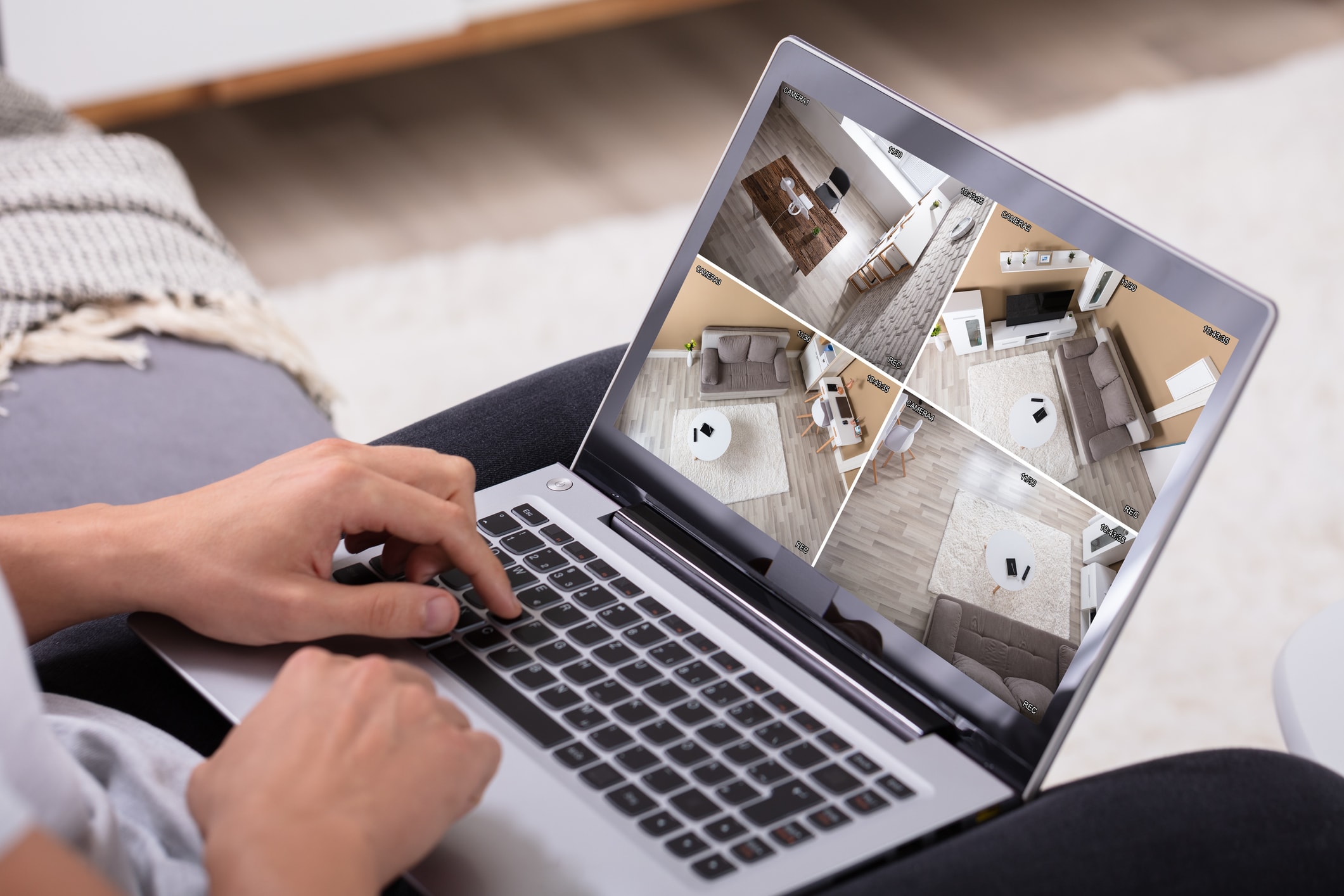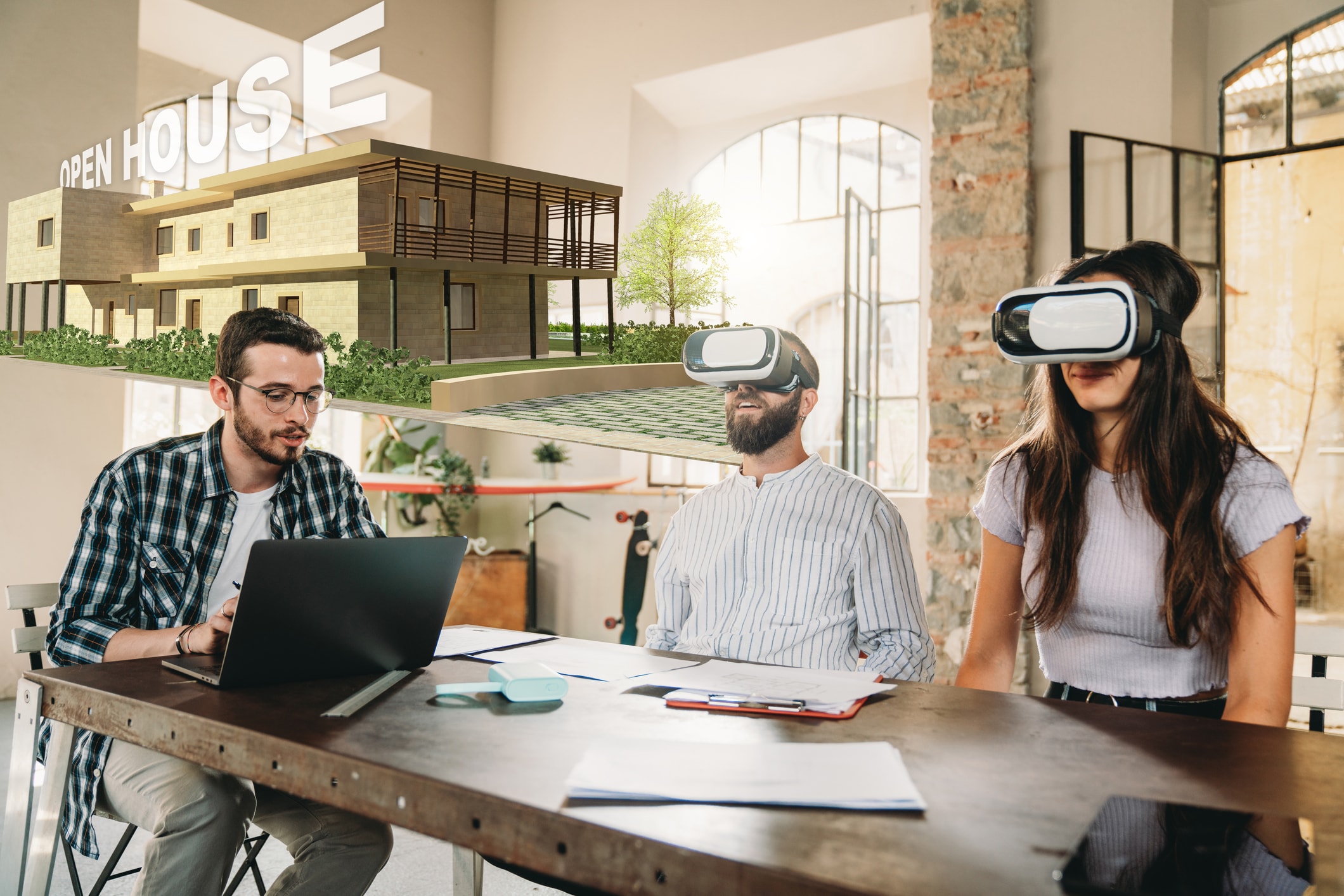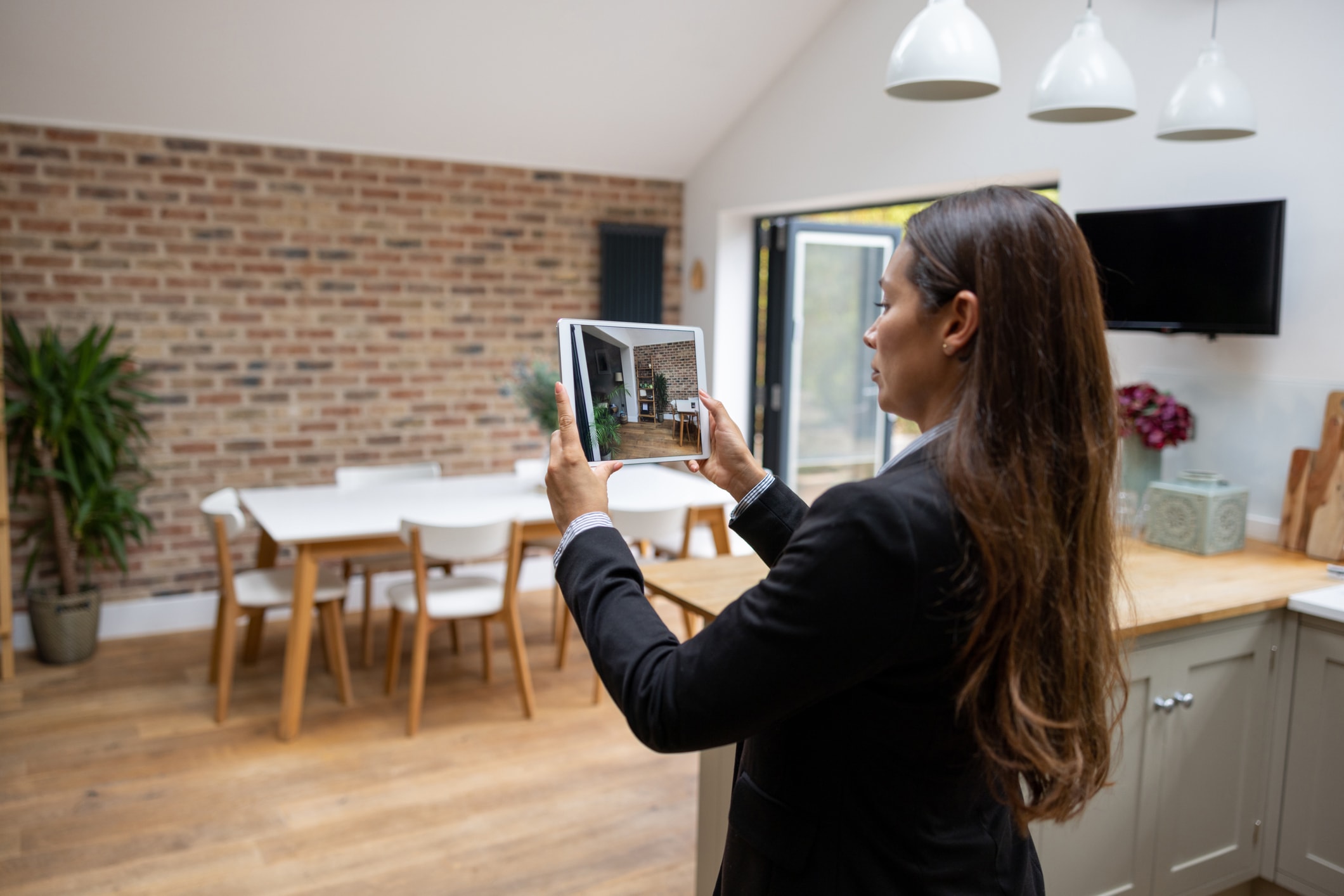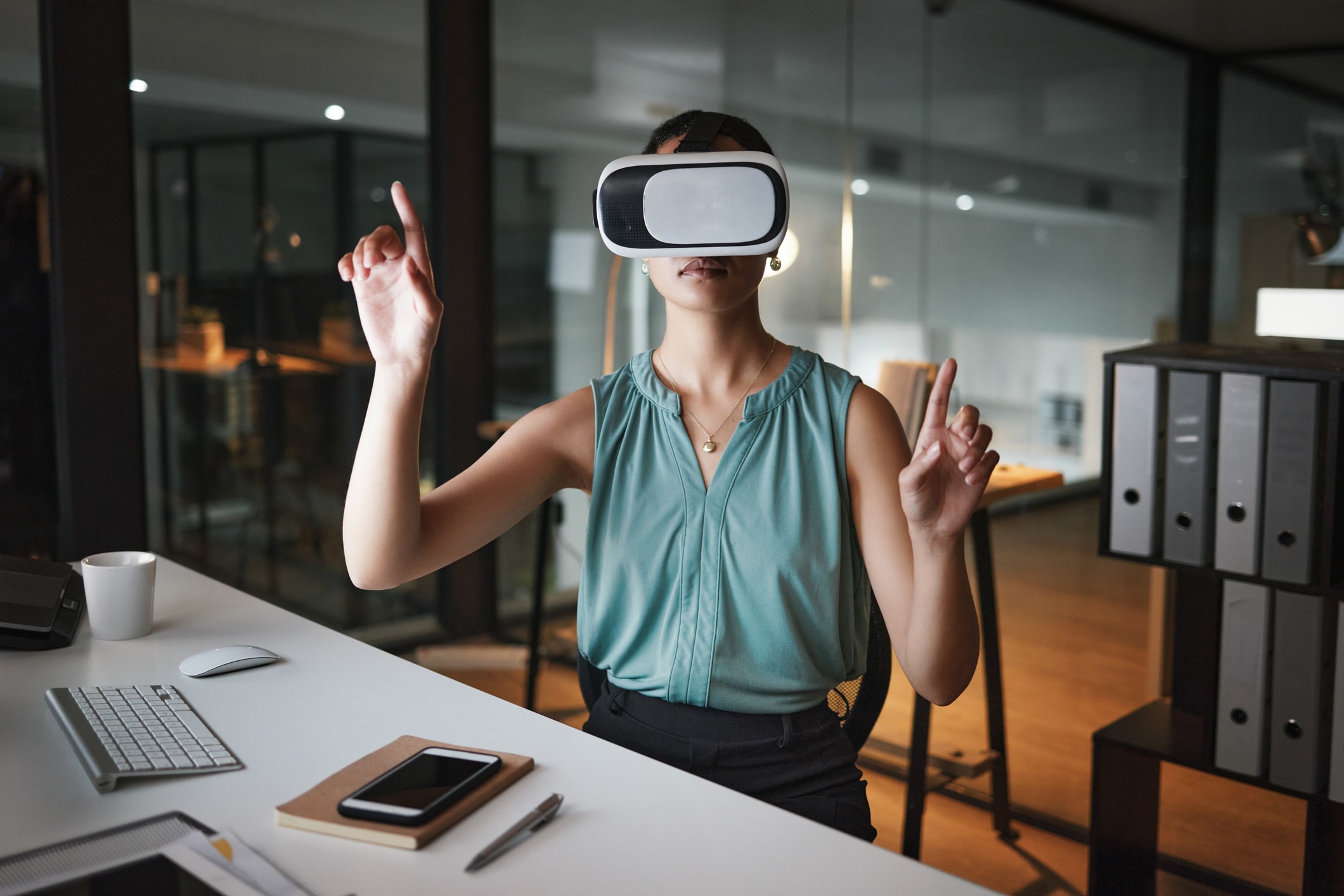The real estate industry has come a long way from printed listings and traditional open houses. Today, the augmented reality real estate landscape is being transformed by innovative technologies that are revolutionising how properties are marketed and sold. Among these, augmented reality (AR) stands out as a powerful tool that reshapes the real estate business by offering agents and developers new ways to engage prospective buyers.
We’ll explore the various ways AR is revolutionising real estate marketing, from virtual property tours and interactive floor plans to virtual staging and AR-enhanced marketing materials. We’ll also explore how AR tools and augmented reality real estate apps provide real estate agents and developers with the edge they need to thrive in a competitive market.
By enhancing the property viewing experience, AR enables real estate professionals to close deals more efficiently and offer potential buyers immersive, interactive experiences that make informed decisions easier than ever.

Understanding Augmented Reality in Real Estate
What is Augmented reality for real estate?
Augmented reality (AR) is a cutting-edge technology that overlays digital information—images, text, or 3D models—onto the physical world in real-time. Unlike virtual reality (VR), which immerses users in a completely digital environment, AR enhances the real physical world by adding interactive digital content that users can engage with through devices like smartphones, tablets, and AR glasses. In real estate, AR allows potential buyers to visualise properties in ways that traditional methods can’t match.
Why AR Matters for Real Estate Agents
For agents, using AR in real estate represents an opportunity to enhance visualisation, streamline the sales process, and provide an engaging experience that resonates with tech-savvy buyers. Whether offering a virtual visit to multiple properties in one go or showcasing potential renovations without the need for physical changes, using AR in real estate often helps clients make quicker, more informed decisions. According to recent studies, AR adoption in the real estate sector is steadily increasing, driven by its ability to deliver enhanced visualisation and operational efficiency.

4 Key Applications of Augmented Reality in Real Estate Marketing
-
Virtual Property Tours
AR-powered virtual property tours allow prospective buyers to explore properties remotely with an app that creates an immersive experience that brings listings to life. This technology enables buyers to navigate through a property as if they were physically there, examining every detail from various angles, which is especially beneficial for international buyers or those considering multiple properties.
Virtual tours expand market reach, save time on physical showings, and cater to potential buyers who cannot visit in person. AR also allows real estate agencies to offer a more engaging experience that stands out in a crowded market.
Real estate agencies using AR for virtual property tours have reported higher engagement rates and quicker sales cycles. For example, agencies implementing AR tours during the pandemic saw a significant increase in online property viewings, leading to successful transactions without traditional in-person visits.
-
Interactive 3D Floor Plans
Interactive 3D floor plans enabled by AR technology offer a more dynamic way to understand a property’s layout. Potential buyers can explore these floor plans on their mobile devices, getting a better sense of space, flow, and how their furniture might fit.
This technology provides a personalised viewing experience, allowing buyers to rearrange furniture, view different interior design options, and even simulate potential renovations. This interactive experience helps buyers feel more connected to the property, making decision-making easier.
Several AR tools and apps like Matterport and MagicPlan allow real estate professionals to create interactive 3D floor plans that enhance the property marketing experience.
-
Augmented Property Staging
Traditional staging can be expensive and time-consuming, but AR offers a cost-effective alternative known as virtual staging. With AR, potential buyers can see different furniture arrangements and home decor styles within the property, turning an empty space into a dream home with just a few clicks.
AR staging is versatile and allows for endless customisation options, appealing to buyers’ imaginations and helping them visualise the property as their own. This technology reduces the costs associated with traditional staging and provides a blank canvas that can be easily adapted to suit different tastes.
Real estate developers have successfully used AR for virtual staging to showcase properties at different stages of completion, helping buyers envision the final product and making the sales process more efficient.
-
AR-Enhanced Marketing Materials
Incorporating AR into marketing materials, such as brochures and online listings to have a potential buyer explore properties, can transform them into interactive experiences. For instance, QR codes in a brochure can lead to an AR experience where potential buyers can view 3D models of properties or access virtual tours.
AR-enhanced marketing materials engage potential buyers innovatively, setting properties apart from the competition and leaving a lasting impression on potential buyers. This approach is particularly effective in commercial real estate, where investors often seek detailed, interactive presentations before committing to a property.
To integrate AR into your marketing strategy, start with designers who specialise in AR content creation and use AR apps that are user-friendly and accessible to a broad audience.

The Advantages of AR for Real Estate Agents
Enhanced Client Engagement
AR transforms the property search process into an engaging experience that attracts clients. Whether through virtual or augmented reality apps, property tours or interactive floor plans, AR provides a more immersive and memorable way to explore properties.
Improved Sales Efficiency
By enabling quicker decision-making and reducing the need for multiple physical showings, AR can streamline the sales process and reduce costs, leading to faster transactions and happier clients.
Competitive Edge
Adopting AR technology gives real estate agents a competitive edge in a market where standing out is crucial. Tech-savvy buyers and investors are increasingly drawn to agencies that offer innovative ways to view and interact with properties.
Cost-Effectiveness
Although AR technology requires an initial investment, the long-term benefits, such as reduced staging costs and enhanced marketing efficiency, make it worthwhile for commercial real estate investors. The ROI on AR can be substantial, particularly as the technology becomes more mainstream in the real estate industry.

Challenges and Considerations Adopting AR
Cost and Implementation
While AR offers numerous benefits, the initial costs and implementation process can be a barrier for some agencies. It’s essential to carefully consider the financial and technical resources required and the potential ROI.
Client Accessibility
Not all clients may have access to AR-capable devices or be familiar with the technology. Ensuring that AR experiences are user-friendly and providing alternative options for clients less comfortable with technology is essential for broader user adoption.
Integration with Existing Marketing Strategies
AR should complement, not replace, traditional marketing methods. Integrating AR seamlessly into your existing marketing strategy will help ensure that you reach a wider audience without alienating those who prefer more traditional approaches.
Future Trends in AR for Real Estate
Emerging Technologies
The future of AR in real estate looks promising, with developments in mixed reality (MR) and AI-powered AR tools on the horizon. These advancements will offer even more personalised and immersive experiences, further driving innovation in the industry.
Predicted Market Growth
As AR technology continues to evolve, its adoption in the real estate sector is expected to grow rapidly. Industry reports suggest that AR will become integral to real estate marketing and sales, particularly as younger, tech-savvy buyers enter the market.
Long-Term Impact on Real Estate Practices
AR is poised to become a standard tool in real estate transactions, changing how properties are marketed, viewed, and sold. Agents who embrace AR now will be well-positioned to lead the industry as it moves towards a more tech-driven future.

How Real Estate Agents Can Get Started with AR
Evaluating AR Needs
Before diving into AR, assess whether it aligns with your business goals and client needs. Consider how AR can enhance your property marketing and sales strategies.
Choosing the Right AR Tools
Select AR tools and apps that match your specific needs, whether you’re focusing on virtual tours, interactive floor plans, or virtual staging. Look for platforms that offer ease of use and compatibility with your existing systems.
Training and Education
Investing in training for yourself and your team is crucial for successful AR implementation. Online courses, workshops, and webinars can provide the necessary skills and knowledge to effectively use AR in real estate.
Collaborating with AR Specialists
For those new to AR, partnering with AR professionals or agencies can ensure a smooth integration of this technology into your marketing strategy. These specialists can offer tailored solutions and guide you through adopting AR and marketing innovation.

Conclusion
Augmented and augmented reality technology is transforming the real estate industry by providing agents and developers with innovative tools to enhance client engagement, streamline the sales process, and differentiate themselves in a competitive market.
Staying ahead in the real estate business as technology advances means embracing innovations like AR. By integrating AR into your marketing strategy, you can offer potential buyers a more engaging and immersive property viewing experience, ultimately helping you close more deals.
Ready to revolutionise your real estate marketing? Explore AR tools and apps today, and start integrating this powerful technology into your property marketing strategies. The future of augmented reality technology in real- estate is here—don’t miss out on the opportunity to lead the way.
FAQs on Augment Reality in Real Estate
What is augmented reality (AR), and how does it apply to real estate?
Answer: Augmented or augmented reality (AR) is a technology that overlays digital information, such as images, text, or 3D models, onto the natural world through devices like smartphones, tablets, or AR glasses. In real estate, AR enhances the property viewing experience by allowing potential buyers to virtually explore homes, view interactive 3D floor plans, and even visualise how a property might look with different furniture and décor. This technology helps buyers make more informed decisions and enables agents to showcase properties innovatively and engagingly.
How can AR benefit my real estate business?
Answer: AR can significantly benefit your real estate business by improving client engagement, reducing the time needed for physical property showings, and providing a competitive edge in the market. With AR, you can offer virtual property tours, interactive floor plans, and virtual staging, which help potential buyers visualise the property and make quicker decisions. Additionally, AR can enhance your marketing materials, making your listings stand out and appealing to tech-savvy buyers.
What are the costs involved in adopting AR technology for real estate?
Answer: The costs of adopting AR technology in real estate can vary depending on your chosen tools and platforms. Initial expenses include:
- Purchasing AR software or apps.
- Training your team.
- Collaborating with AR specialists to create custom content.
While there is an upfront investment, the long-term benefits, such as reduced staging costs, increased operational efficiency, and faster sales, often outweigh the initial expenses. Many real estate professionals find that the return on investment (ROI) justifies the costs.
Do my clients need special devices to use AR in real estate?
Answer: Most AR experiences in real estate can be accessed through standard devices like smartphones and tablets, which many clients already own. Some advanced AR applications may require AR glasses, which are only sometimes necessary for basic real estate applications. It’s important to ensure that your AR experiences are user-friendly and accessible to clients, regardless of their tech savvy. Providing guidance on using the technology can also help make the process smoother for clients.
How can I get started with integrating AR into my real estate marketing?
Answer: To start with AR in your real estate marketing, assess your business needs and goals to determine how AR can enhance your strategy. Research and choose AR tools or user-friendly platforms that are compatible with your current marketing methods. Invest in training to ensure you and your team are comfortable using the technology. Consider partnering with AR specialists if needed, and start by incorporating an AR tool into areas like virtual tours, interactive floor plans, and marketing materials. Gradually expand your use of each AR tool as you become more familiar with its benefits and capabilities.
